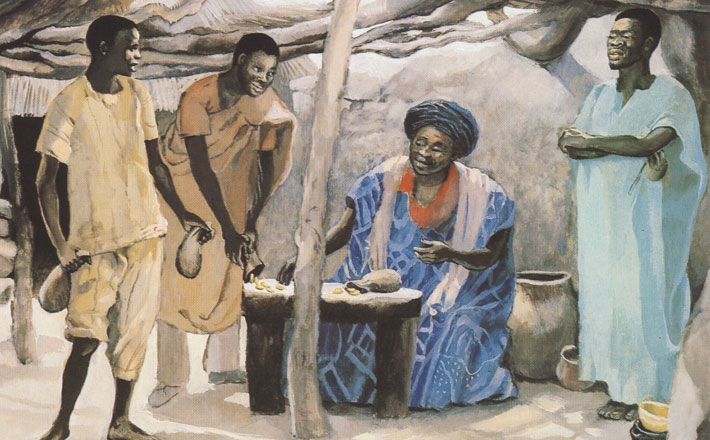Commentary on Psalm 90:1-8 [9-11] 12
In the 1980s I attended a denominational conference at which one of the preachers roundly criticized the use of Psalm 90 for funeral services.
Although the psalm was included among possible readings in the Book of Common Worship at the time, he marshalled arguments based on the psalm’s overwhelming negativity. The issue of liturgical choices notwithstanding, one left that speech feeling as if the psalm was inappropriate for any service of Christian worship, perhaps even for Christian theology or reflection. It will be clear from what follows that I do not share that negative verdict on the status of Psalm 90.
As far as I can tell, this is Working Preacher’s third round of treating the lectionary psalm texts, with this portion of Psalm 90 already discussed by two eminent psalms scholars: Rolf Jacobson (2011) and Bill Bellinger (2014).1 It’s difficult to improve on their historical, literary, and thematic insights; so I commend their entries before you read my own, because my biblical and theological interpretations assume many of their conclusions about the use of the psalm in Israel’s life and worship. Both authors stress the psalm’s contrast between divine eternality and human temporality, and they explain its connections to Israel’s wisdom tradition. In particular, Bellinger helps us understand the significance of the psalm’s location at the beginning of Book IV of the Psalter; and Jacobson demonstrates the thematic notes of joy and promise in a poem that many dismiss as utterly pessimistic.
Their conclusions form the basis for sound Christian appropriation of Psalm 90 that relates to the Sunday’s other lectionary texts and to the larger canonical drama of the Triune God’s plan of creation and redemption through Jesus Christ. Thus, whether you choose to preach only from Psalm 90 or let several lectionary readings form a larger constellation of texts, you can help your congregation see that the theological underpinnings of Psalm 90 are not unique to it but are part of a much larger scriptural network. When seen in this biblical-theological perspective, the poem no longer appears to be a pessimistic or fatalistic cry of hopelessness. Quite to the contrary, we are surprised by its power to evoke in us a sense of stewardship, justice, and hope. Here are some possible thematic directions to consider:
Creational mandate for work
Though not included in this Sunday’s psalm selection, verses 13-17 become a prayer about human work that balances the opening reference to the work of God who “formed the earth and the world” (verse 2). This frame places the entire psalm within the scope of the Old Testament’s creation theology, wherein human beings are image bearers made for fellowship with the creator and one another (Genesis 1:26-28). The creation story of Genesis 2 adds another facet of our place in creation, caring for the world God has made (Genesis 2:15-17). Each of us, by virtue of our humanity, represents God on earth and therefore follows in the footsteps of the creator’s stewardship. The gospel lection from Matthew 25:14-30 also assumes the creator’s authority to expect results from using the gifts God has given us. It is not hard to imagine the early Christian community of which Matthew was a part — or our own latter-day communities — asking what believers should do with the time that has been given to them.
Prophetic message of justice
The alternative Old Testament lesson, from Zechariah 1:7, 12-18, presents a message based on a theology of justice that harmonizes very well with Psalm 90’s lament about the brevity and difficulty of life. However, Zechariah directs the language of God’s “wrath” and human “toil” at the complacent Israelites who turn a blind eye toward injustices. Whether or not they have worked for their wealth makes little difference: neither houses nor riches can save them from God’s judgment (Zechariah 1:13, 18). To be sure, Zechariah is aware of the basic human condition before God; but some of his contemporaries apparently assumed that human mortality effectively left God out of the equation — “the Lord will not do good, nor will he do harm” (1:12) — thus missing Psalm 90’s sobering yet truthful claim that the Lord is God (Psalm 90:2). The fact that all people and all things belong to God joyfully frees us from the desperate attempt to accumulate resources at the expense of the most needy and vulnerable.
Apocalyptic motivation for hope
Psalm 90 and its companion readings seem especially appropriate for second to the last Sunday of the liturgical year, just prior to Christ the King/Reign of Christ. The spate of “end of the world” books and motion pictures testifies to our culture’s anxiety and lack of meaningful resources for understanding and responding to the end of life as well as human history. These are obviously not new concerns, as the topic of “the day of the Lord” from 1 Thessalonians 5:1-11 clearly testifies. Whereas Psalm 90 considers the brevity of human existence in terms of the wrath of God, Paul assures his readers that “God has destined us not for wrath but for attaining salvation through our Lord Jesus Christ” (1 Thessalonians 5:9).
Far from being an occasion for fear, knowledge of God’s judgment upon humankind is a source for encouragement and hope. Our union with Christ in his full humanity assures us that through the eternal Word we have experienced the powerful “dwelling place” of God’s refuge. Death could not hold him, and it shall not hold us. The Heidelberg Catechism famously answers the question, “What is your only comfort in life and in death?” by affirming in part, “That I am not my own, but belong — body and soul, in life and in death — to my faithful Savior, Jesus Christ.”2 That affirmation is possible because of the rich theological drama in which Psalm 90 plays a necessary and — in light of the entire Christian scripture — preparatory role.
Notes


November 19, 2017